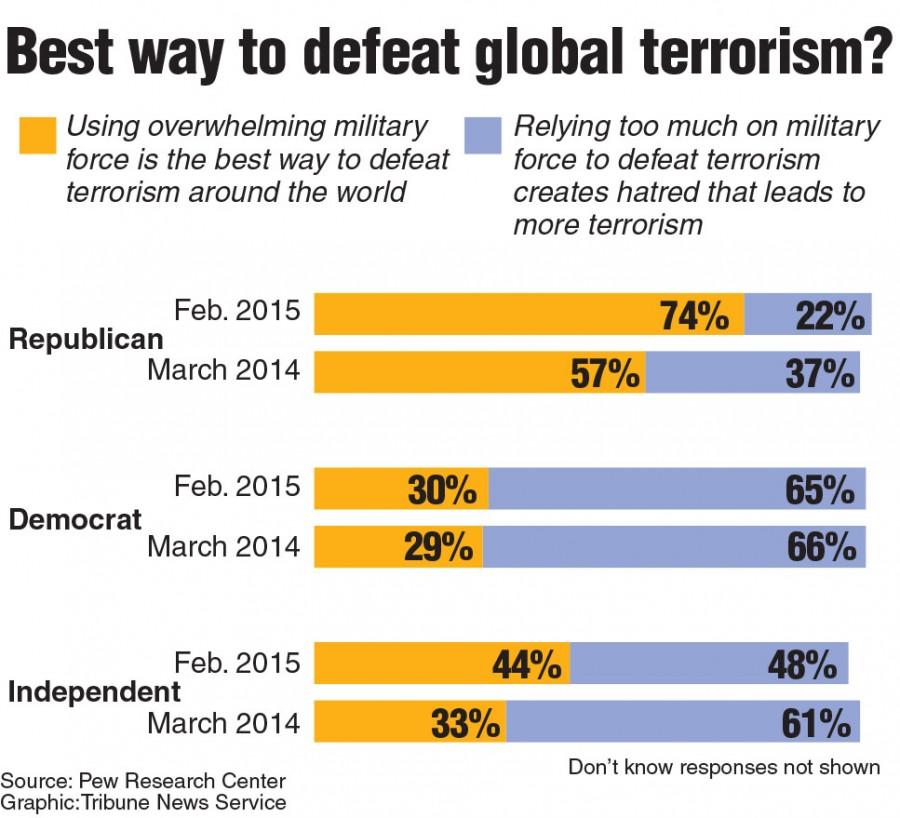The Bottom Line: Home grown terrorism has complex roots
Poll asking if using military force is the best way to defeat terrorism.
April 8, 2015
How can we stop teenagers from fighting overseas for terrorist organizations? Is the cost of safety worth the price of freedom?
On February 17, three teenage schoolgirls, Kadiza Sultana, Shamima Begum and Amira Abase, departed Gatwick Airport in London, but it wasn’t your ordinary day off playing hooky. Authorities believe the girls were contacted by an ISIS recruiter and took a plane to Turkey where they planned to cross the border into Syria. What’s disturbing about this case and others like it, is that these girls were not “lost souls.” They were described as “studious, driven, caring” and had no signs of radicalization prior to their disappearance.
Not coincidentally, Islamophobia is on the rise in the West. Many young Muslims may feel hated by their own peers and even their governments. Those without strong role models may turn to the internet for answers. There, ISIS recruiters can influence someone’s judgment. In addition to people leaving for these countries to join ISIS, some people who have left have returned home. There is wide speculation about what their motives were for traveling and eventually returning.
So how did ISIS come to be and what do they want?
The Iraq war scattered Al Qaeda, pushing factions into nearby countries. One group entered northern Syria during the Syrian Civil War, which has left parts of the country in ruin. In this power vacuum they took Raqqa, a major city, and made it their capital. Later, the militia returned to a destroyed Iraq and took control of Mosul, Iraq’s second largest city. From there they marched towards Baghdad, taking smaller cities along the way, where fighting continues to this day.
ISIS stands for the Islamic State in Iraq and Syria. Government officials recently have been using the term ISIL, which stands for the Islamic State in Iraq and the Levant. The Levant is the historical term for the middle eastern region directly east of the Mediterranean Sea. Government officials use this term to describe them because it emphasizes the militia’s goal of eventually controlling the entire region. They wish to break the borders of middle eastern countries and create a new state governed by their radical views. They self-finance themselves through extortion and by capturing oil fields. CBC estimates they make 1-2 million dollars a day from this oil. They have affiliates in countries around the middle east, and they spread fear by having regular executions. Nicholas Rasmussen, director of the National Counterterrorism Center, says that as many as 20,000 foreign fighters from 90 different countries have traveled to the ISIS battlefield. About 3400 are from Western countries.
This brings the issue full circle to the matter at hand. Teenagers, boys and girls alike, are traveling overseas to fight for a radicalized cause in the Middle East. What are some ways we can stop this?
One increasingly popular approach among western countries is severe consequences. Some believe that in order to prevent teenagers from leaving to fight overseas, our government must enforce strict and harsh punishments for those who do. Some countries are looking for a way to revoke citizenship from those who make that trip. Austria made it legal to detain anybody suspected of supporting the Islamic State. Britain is looking to prevent suspected supporters from returning at all. European countries are becoming more supportive of policies that swap individual freedom for harsh preventive measures.
While taking legal measures against those who have committed actual crimes is necessary, it is important that the world does not follow Europe in its dark spiral. Those returning from these countries aren’t necessarily America’s enemies. In our legal system we believe someone is innocent before proven guilty. Is it right to persecute these people as guilty before they are proven innocent?
Doing that will only fan the flames that drive people to these radical causes. ISIS recruits people from western countries by telling them that the society they live in will never accept them for who they are. ISIS makes these people feel like outcasts to the point that they leave their family to fight for them. If someone who leaves home gets homesick or realizes the reality of their decision, they might return. They’ll return to a country that isolates them as a threat to our way of life without knowing their story. They will be monitored relentlessly by the government and will never be trusted by their peers. In that case, we will have proven the terrorists right. This will make returnees more likely to commit acts of violence against said governments and therefore have made us less safe. ISIS views us as an unforgiving people. Let’s prove them wrong.
The Bottom Line:
In order to prevent teenagers from fighting overseas we need to prevent radicalization in the first place. We shouldn’t isolate muslims as threats – doing that will only push vulnerable populations of teenagers to these causes. Islam is a religion that promotes peace. The radical terrorists who misinterpret it are our only enemies. Back at home, our counterterrorism policies should reflect our values of life, liberty and the pursuit of happiness. We should fight terrorism without discrimination, fear or retaliation. Fighting fire with fire will only engulf the world in flames.












